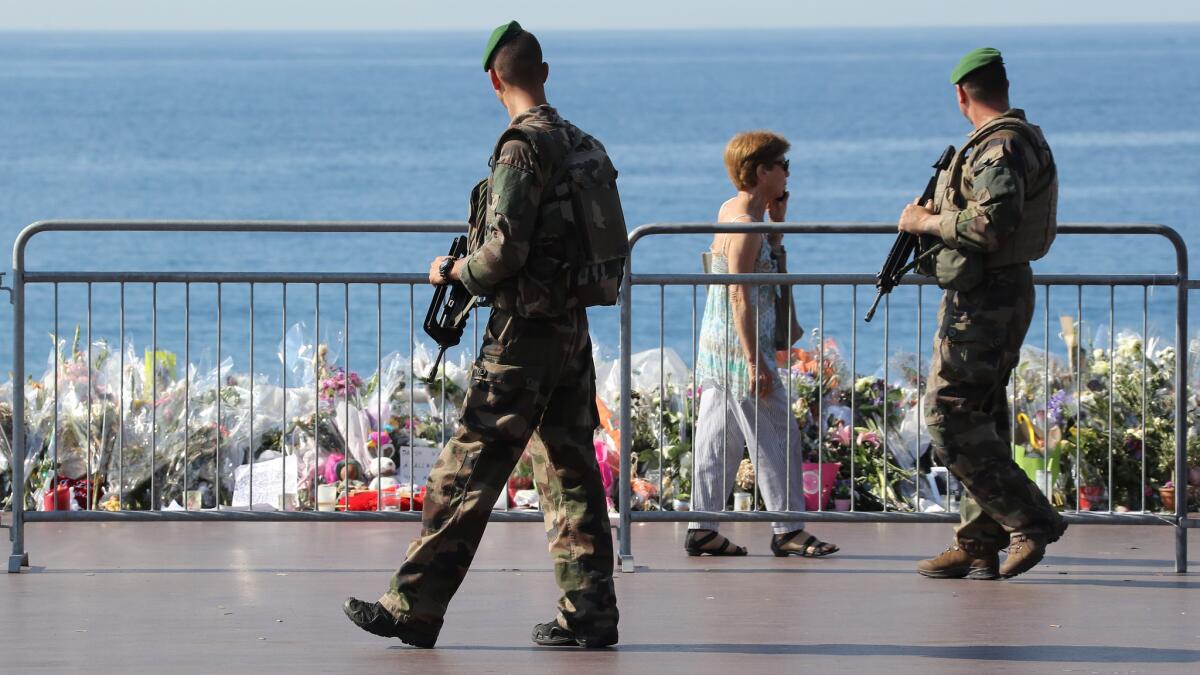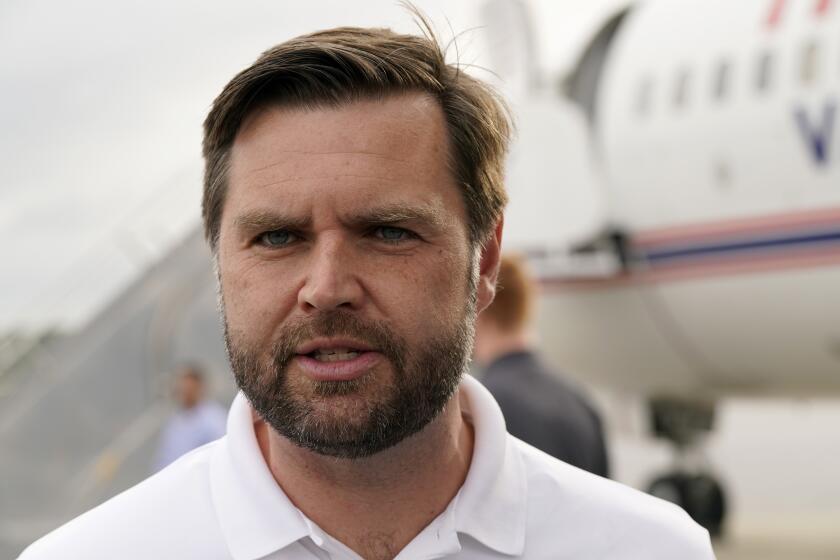French wonder after latest terror attack: What can we do to feel safe?

Reporting from Nice, France — Terrorism in France has shifted from bloodbaths at a newspaper office and a concert hall in Paris to a summer tourist hot spot on the Mediterranean.
The killers have included trained attackers with automatic rifles and bombs and a man driving a tractor-trailer into an unsuspecting crowd of revelers.
As France struggles to come up with an antidote to the series of terror attacks that have killed scores of people in the last 18 months — including 84 in Nice last week — its increasingly unpopular government has warned the public that the country is at war. Officials have advised that there will probably be more terror attacks like last Thursday’s low-tech atrocity with a truck.
“The reality is that France is at the epicenter of the current global terror threat,” said Raffaello Pantucci, a counterterrorism expert and associate fellow at the International Centre for the Study of Radicalisation in London.
Security experts say there are several reasons France is likely to remain vulnerable.
Among those: France is a major combatant in the U.S.-led coalition fighting Islamic State extremists, with its air force bombing targets in Iraq and Syria, and France has a large number of poorly assimilated Muslim immigrants from its former colonies in North Africa — Algeria, Tunisia and Morocco. With high youth unemployment, some are susceptible to recruiting from Islamic State.
Also, France has stirred anger in the Arab world because its government has been accused of discrimination against Muslims for laws banning headscarves in public schools and outlawing full-faced veils in public.
Nice has traditionally been a gateway into France from North Africa. A report by the International Centre for Counter-Terrorism in April found that more than 900 French citizens have journeyed to Syria and Iraq to join forces with the extremists and at least 250 have returned. There are also some 11,000 names of French citizens on its terror watch lists, including 2,000 with suspected direct links to Islamic State.
“All of France is under threat from Islamist terrorism,” French President Francois Hollande said after the Bastille Day attack by a Tunisian immigrant who, according to prosecutors, had recently become radicalized. Islamic State later claimed indirect responsibility for the attack.
France has been under a heightened state of alert for months, and heavy security was in place across the country for the monthlong European soccer championships that had finished without any incidents of note four days before the July 14 attack in Nice.
Under a state of emergency, authorities have the power to place those suspected of terrorist activity under house arrest without evidence and without charge, or search homes without warrants.
The French army launched Operation Sentinelle after the Charlie Hebdo attacks in January 2015 to counteract terrorist threats and protect “sensitive” targets.
Since 2015, 10,000 soldiers have been deployed to sensitive sites. Hollande’s recruitment drive aims to see the gendarme reserve bolstered from 28,000 to 40,000 by 2018.
Speaking in Lisbon on Tuesday at the start of a tour aimed at reviving European Union partnerships after Britain’s vote last month to leave the 28-nation bloc, Hollande said the “first priority” of Europe is “security and defense.”
Some experts said France may benefit from looking at what has succeeded in other countries. In Britain, for example, which for years faced terrorism, officials rely on formal, regulated organization of its intelligence bureaus, which have clear mandates but intimately share intelligence.
Nevertheless, several people in Nice said they remained baffled that security services weren’t able to stop one man in a truck from killing so many people.
Valerie Collignon, a 38-year-old worker in a nail salon, said she did not think France was prepared for the war against terrorism.
“We can’t protect ourselves from every madman, but we’ve got to try harder,” Collignon said. “I want to see more police patrols and more security at big public events.”
Philippe Castelli, an 18-year-old student in Nice, said a lot of people are angry, as evidenced by Prime Minister Manuel Valls being booed and jeered at a memorial ceremony Monday.
“What kind of future do we have if these terror attacks keep happening? The president is weak, the prime minister is even worse,” Castelli said. “We need a great leader to move us forward. We’re angry and frustrated and it seems there aren’t any good options.”
Several security experts said they understood the frustration, but that some kinds of terrorism are virtually impossible to prevent.
“France was already in a state of emergency. Soldiers and police are already patrolling all over the place all the time. You feel like you’re in Beirut in the 1970s,” said Olivier Guitta, managing director at GlobalStrat security consulting firm. “The only way to prevent an attack like that would have been to cancel the celebrations ahead of time.”
Kirschbaum and Harvey are special correspondents.
More to Read
Sign up for Essential California
The most important California stories and recommendations in your inbox every morning.
You may occasionally receive promotional content from the Los Angeles Times.










